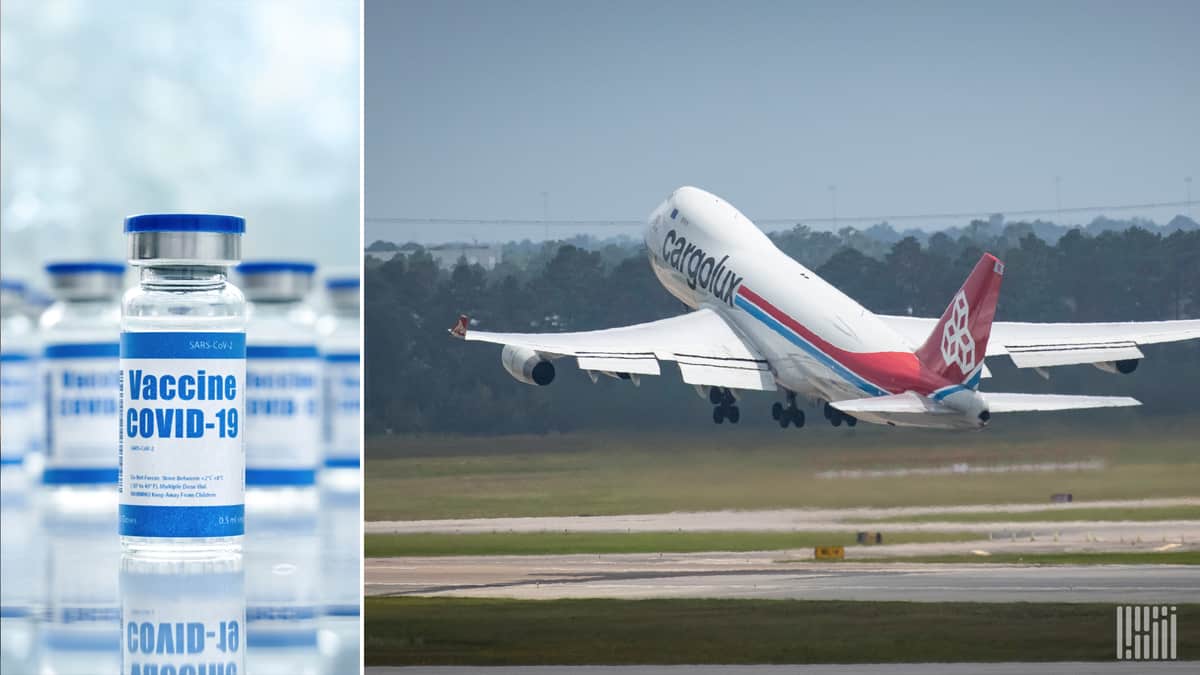Airports should use their influence as regional economic engines to organize logistics companies, pharmaceutical manufacturers and regulators into close-knit cargo communities that collectively plan COVID-19 vaccine transport to prevent delays or product damage, according to a new report.
With so many handoffs — factory, freight forwarder, shuttle trucker, airline warehouse, aircraft, customs clearance — and extra security precautions, the opportunity for breakdowns is high without a team approach, The International Air Cargo Association and Pharma.aero, a forum for cross-industry coordination, said.
Adopting a cargo community approach to strengthen collaboration at the local level for coronavirus vaccine distribution also has long-term benefits for addressing sustainability and the trend toward digital business processes, the authors explained.
“It is critical for airports to plan and prepare themselves by mapping out their infrastructure and collaborating with their stakeholders to effectively manage the distribution of the COVID-19 vaccines,” said Emir Pineda, manager of aviation trade and logistics for the Miami-Dade Aviation Department and a TIACA board member, in an announcement on Tuesday about the report.
Cargo and passenger airlines are playing a prominent role moving approved vaccines from multiple drugmakers to local distribution points around the world. So far, vaccine transport has functioned smoothly around the world, but there could be more challenges once production lines ramp up, new vaccines enter the market and distribution begins to penetrate less-developed countries that lack extensive ground-delivery networks and cold-chain infrastructure.
The complexity of pharmaceutical logistics is compounded in the coronavirus crisis because of the urgent need for mass immunization of 8 billion people and new temperature-sensitive vaccines, which require specialized thermal containers to keep them frozen.
The internal process for handling medicines and biologic products — including documentation, transportation lead times and exposure to ambient weather conditions — are often hidden from pharmaceutical manufacturers, increasing the risk of mishandling.
The report emphasizes the importance of information sharing and taking inventory of available infrastructure. It also lists best practices for fast, reliable, secure and transparent handling of vaccines by each supply chain partner.
TIACA and Pharma.aero identified Brussels; Edmonton, Canada; Miami; and Singapore as air hubs that have successfully established local task forces to enable open communication and logistics collaboration.
Airport cargo communities
Not mentioned in the report is Amsterdam Schiphol, which developed its cargo community structure several years ago and leveraged it to coordinate COVID vaccine readiness among all stakeholders. It mapped capacity across the air supply chain, developed contingency plans and coordinated with other air hubs to ensure stringent pharmaceutical-handling standards are met for the airport-to-airport leg of the trip.
Brussels Airport, which handled the first shipments of the Pfizer/BioNTech vaccine to the U.S. and U.K. in December, helped pioneer the cargo community approach during the past decade. At the encouragement of the airport’s cargo division, transport operators, shippers and government agencies use the same standard processes and compliance checks to speed up shipment flow.
In September, Brucargo and Air Cargo Belgium, a nonprofit organization that facilitates airfreight collaboration, formed a task force called BRUcure to align all resources and procedures for correct handling of COVID vaccines. It started by defining all the possible scenarios for transporting, packaging and storing various types of vaccines. Information collected included vaccine manufacturing locations, number of doses per person and the volume that a cargo pallet with vaccines will occupy. The committee also created a centralized platform for sharing all relevant data on vaccine shipments and a control-tower function to continuously monitor them. The system allows the community to immediately know where a shipment is located and whether it has been stored in the correct refrigerated areas.
Miami International Airport’s MIAVAC19 Task Force identified the exact amount of pharmaceutical refrigerated space available on airport property, mapped out the airport’s parking capacity for large freighter aircraft, designated potential truck parking and staging areas, and conducted training sessions for forwarders and importers on the latest federal guidelines for transporting vaccines.
Singapore’s Changi Airport task force refined operations to facilitate expedited handling and clearance of vaccine shipments and worked to plug data gaps, according to the report.
And airport cargo communities should collaborate with each other too to ensure product quality and prevent loss, experts say.
Airport-to-airport pharmaceutical corridors are a way to increase the confidence of pharmaceutical and life sciences shippers that the supply chain can ensure product quality and prevent loss, Pharma.aero said in a December white paper.
The concept involves having airports, airlines and ground-handling companies on both ends that have achieved stringent industry certification for handling pharmaceutical products. A test between Brussels and Hong Kong airports in 2019 demonstrated that more than 95% of key performance indicators were met, with zero temperature excursions, for 47 separate shipments.
A dashboard showed how performance aligned with service-level agreements.
Click here for more American Shipper/FreightWaves stories by Eric Kulisch.
RELATED NEWS:
Schiphol airport organizes cargo community to expedite COVID vaccine distribution












Stephen Webster
Everyone needs to work together with normal competition to get the vaccines and other medical supplies. I see many companies putting people ahead of profits on this one.